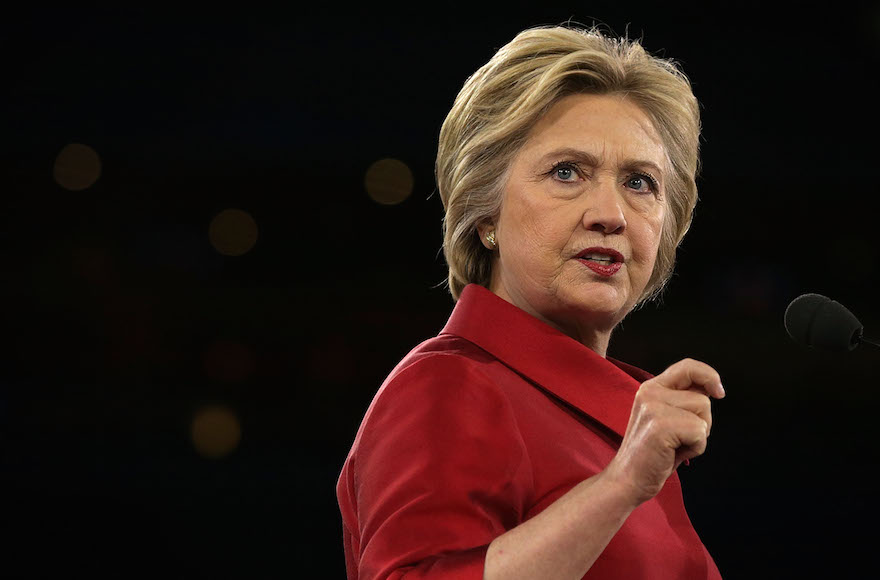WASHINGTON, D.C. (JTA) — I support Hillary Clinton for president because I have seen her work up close – as first lady, senator from New York and secretary of state. She has the temperament, experience and judgment to be commander-in-chief and our country’s representative to the world. And I know she has a deep commitment to the State of Israel and a special sensitivity to help Holocaust survivors.
During his first term, President Bill Clinton appointed me his special representative for Holocaust issues to provide belated justice for Holocaust victims and their families. With his and Hillary’s strong support, I helped recover $8 billion for slave and forced labor, unpaid insurance policies, Nazi-looted art, and property restitution and compensation.
As senator from New York and then as secretary of state, Hillary Clinton continued her intense efforts for Holocaust victims and survivors. In my service as special adviser to the secretary of state on Holocaust issues, she supported me when we advanced a number of new initiatives to help survivors.
Having worked across four U.S. administrations, I’ve seen firsthand that every president needs a temperament that can endure great pressure.
Hillary Clinton has it. Donald Trump does not.

Stuart E. Eizenstat (Courtesy of Eizenstat)
With his dangerous combination of impulsiveness, erratic behavior and emotional outbursts when he is criticized, Trump would be a disaster in the Oval Office.
Trump even confuses our allies and foes. He has expressed admiration for Vladimir Putin’s leadership style; he is considering recognizing Russian control of Crimea, which it brutally invaded; and has suggested Russia conduct cyber espionage against his political opponent at a time when the U.S. government is increasingly concerned that Russian intelligence is seeking to interfere in our election.
Trump has also upset our NATO allies by putting conditions on our longstanding obligations to come to their defense if they are attacked. It is critical to American global leadership and influence that our allies know they can depend on us to honor our obligations. This was recognized recently by 50 former senior Republican officials who said Trump lacks the “character, values and experience” to be president, and “would put at risk our country’s national security and well-being.”
This election is not about partisanship, it’s about our values as a nation. Hillary Clinton believes that at a time of great challenge at home and abroad, our diversity is a great source of our country’s strength. That’s why she says we’re “stronger together.”
Trump, on the other hand, seeks to inflame one group against another. Given our own history, American Jews have a special concern with this approach – especially when it comes to his plans to round up and expel over 10 million immigrants and their children. And in a chilling echo of the immigration barriers that Jewish refugees found when they sought safety from Hitler’s clutches in World War II, Trump said he wants to bar all refugees who are Muslim from our shores.
One of the greatest contrasts between Trump and Clinton is over Israel and U.S.-Israel relations. The United States is Israel’s only real ally, and having the right person in the Oval Office is crucial to Israel’s security.
Trump has made no effort to study and learn from the peace process, and has only the most fleeting relationship with Israeli leadership. He has even said that he was “a neutral guy” when it came to the conflict between Israel and the Palestinians. At one point, Trump even suggested that Israel should repay the U.S. for the military aid it provided.
Meanwhile, Hillary Clinton has always been among Israel’s strongest supporters. In the wake of the continued knife attacks on innocent Israelis, she publicly demanded that the Palestinian leadership stop inciting their people to violence, publicly condemn terrorism and end the pernicious practice of paying rewards to the families of terrorists.
She has strong relationships with leaders like Prime Minister Benjamin Netanyahu, with whom she played a major role in negotiating the 2012 Gaza cease-fire, and supported vital U.S. assistance to Israel’s Iron Dome anti-missile system. Clinton has set out a concrete plan to take the U.S.-Israel relationship to “the next level.” And she called for the expeditious completion of a new 10-year defense memorandum of understanding to ensure that Israel maintains its qualitative defensive advantage; the memorandum was signed last week.
Her plan includes a pledge to work shoulder to shoulder with Israel to combat the rising terrorist threat in the region. Clinton has called for tougher sanctions on Iran for its support of terrorist groups like Hezbollah and Hamas, to curb its ballistic missile development, and to cut the flow of Iranian funds and arms to Israel’s enemies. She has pledged to take swift action, including militarily if necessary, if Iran attempts to obtain a nuclear weapon. And Hillary will do everything in her power to combat the growing Boycott, Divestment and Sanctions effort to marginalize Israel.
Israel will have no better friend in the Oval Office than Hillary Clinton, and I enthusiastically support her.
(During the Clinton administration, Stuart E. Eizenstat was the U.S. ambassador to the European Union, undersecretary of commerce and of state, deputy secretary of the Treasury, and special representative of the president on Holocaust issues. During the Carter administration, he was the president’s White House chief domestic policy adviser.)
RELATED:
At a time of Jewish introspection, Donald Trump offers hope
JTA has documented Jewish history in real-time for over a century. Keep our journalism strong by joining us in supporting independent, award-winning reporting.







